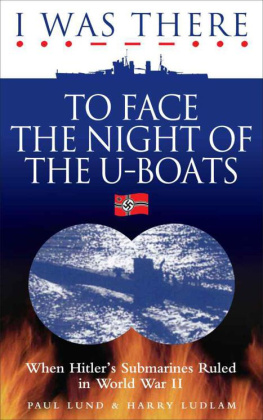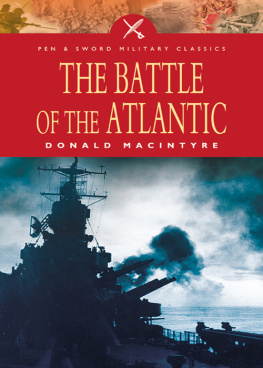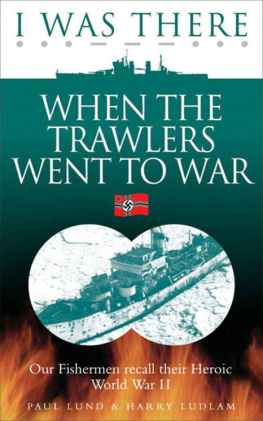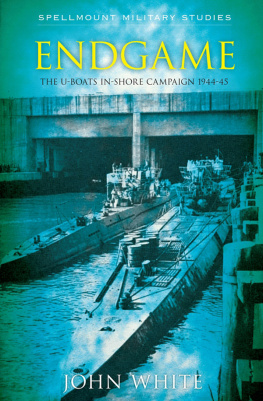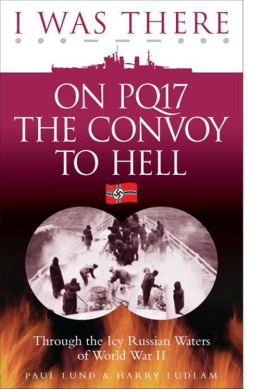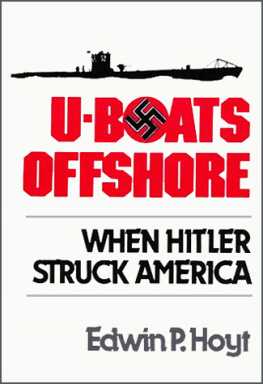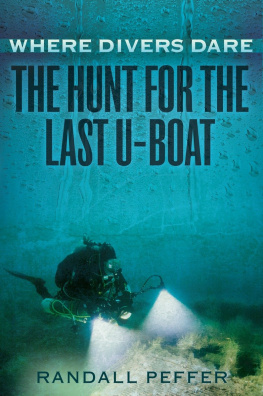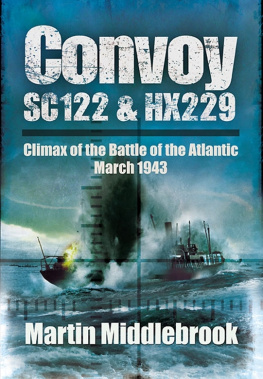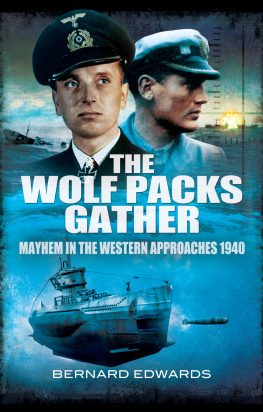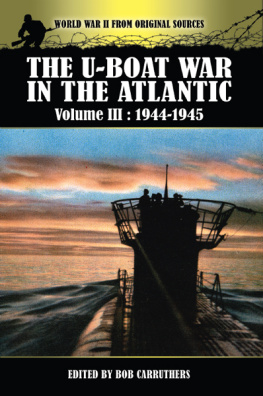
Table of Contents
Dedication
SC7 was one of many convoys to sail the North Atlantic.
This book is written to the memory of them all,
and the men who sailed and escorted them.
The Darkest Days
October 1940. In this 14th month of the war with Germany, Britain stood alone with her back to the wall. After a winter of phoney war, the year had seen disaster after disaster: the withdrawal from Norway; the fall of Denmark, Holland and Belgium; the evacuation from Dunkirk and the capitulation of France, followed by Mussolini's entry into the war on the side of Hitler. Day by day, the rolling tide of Nazism had spread over the newspaper maps of Europe like some great black evil blot.
Young men had gone fresh to Norway and France and returned as veterans, disillusioned, though not beaten. The carefree notes of the popular song 'We're Going to Hang Out the Washing on the Siegfried Line' had gone sour.
Now, the imminent invasion of England by the German army seemed inevitable.
The first enemy onslaught in the skies had been beaten off gloriously by the RAF in the Battle of Britain. But every night now, up to 1,000 German bombers at a time were coming. On some nights in London, bombs fell every few minutes, and the sky raged red from the glare of burning buildings. Stabbing fingers of criss-crossing searchlights sought the high-flying bombers. As well as their deep drone, there was the thump-thump-thump of anti-aircraft guns and the whistle of bombs, as a cacophony of explosions, alarms and cries, and shrapnel filled the streets.
At this time of crisis, people anxiously scanned the newspapers and listened for the news on the BBC, sturdy reliable voice in a tumbling world. Grim communiqus filled the gaps between such reassuring programmes as Hi Gang, Thanking Yew! and Sandy Macpherson at the organ. Days of Music While You Work were countered by nights of misery, death and stubborn heroism. The great bombing blitz began in September, and by the end of that month, 17,000 men, women and children had been killed or seriously injured in the savage air raids. In an even bleaker October, the casualty numbers continued to rise.
Above it all hung the dark cloud of imminent invasion, despite the constant hammering of enemy Channel ports by the RAF. Churchill frankly admitted to the nation that Germany had ships and barges ready to transport an army of half a million men to the beaches of Britain if they could make the crossing. 'We are waiting,' he said, pugnaciously. 'So are the fishes.'
Also waiting were 1,000 British fighting ships of all descriptions, some 300 of which were always at sea on anti-invasion patrol. Many of these ships had been withdrawn from duties in the Atlantic and the Western Approaches for the emergency, with the consequence that convoys crossing to Britain from Canada were desperately short of escorts for the ocean voyage. The warships that sailed out to meet the convoys and bring them safely home were also severely depleted.
Losses of merchant ships had risen alarmingly as the rampaging U-boats grew in numbers and daring. Since June 1940, the losses had multiplied, until in September, U-boats sank 59 ships of 295,335 tons, most of these off the northern coast of Ireland, well named the Bloody Foreland.
It was now the blackest period of the sea war, the zenith of four months' slaughter that the U-boat commanders were to look back on as 'the happy time'.
At first, only fast convoys had sailed homeward across the Atlantic from Halifax, Nova Scotia. These HX convoys were made up of ships capable of maintaining a steady 8 or 9 knots. But to increase the flow of supplies across the ocean lifeline and to make use of slower ships, a second type of convoy was begun. These were the SC convoys, which sailed from Sydney, Cape Breton Island, Nova Scotia. The plan was to sail these convoys of old, slow, cargo vessels during the good summer weather, taking 16 days to complete the passage at a laborious 6 or 7 knots. But the urgency of the situation demanded that these ships had, for the first time, to risk the hard and turbulent waters of the North Atlantic in winter. A special light loading line was drawn at the base of the loading marks on their sides: WNA which stood for for 'Winter North Atlantic'. Into the teeth of winter they sailed.
SC7, the seventh of the slow convoys, sailed from Sydney, Cape Breton, at 12 noon on 5 October 1940. It was a convoy of 35 ancient ships carrying vital but mundane cargoes of timber, grain, steel, scrap and iron ore. It was nothing special. It might have lost one ship or maybe a few, then won through to home waters and been quickly forgotten, just another convoy among the hundreds.
But it did not happen that way. SC7 sailed into history as the victim of one of the biggest and most painful surprises sprung by the Germans in the war at sea.
This is the story of convoy SC7, and the men who were there.
Chapter 1
The Admiral's Daughter

In the skies above America, a pretty little blue and red aeroplane was flying firmly on course for Halifax, Nova Scotia, 1,000 miles away. Inside were two young mothers: Mary King, an experienced pilot and owner of the plane, and her passenger, Fynvola James, for whom this was only her second ever flight. They had one parachute between them.
It was 2 October 1940. Fynvola James had received a telegram containing the glad news that her father, a retired admiral and now back in service as a Commodore of convoys, would be able to see her at Halifax before leaving for Britain with his next convoy. In the grim, uncertain days following Dunkirk, she had sailed out to Cleveland with her three young children. Now, with her father and her husband, a naval commander in the Admiralty, both far away in the war, this brief chance to see her father was not to be missed. Mary King had seen to it that within hours they were airborne.
The Stinson light aeroplane flew due east at over 100 m.p.h., following the shore of Lake Erie, then on to Schenectady to land and fill up with 30 gallons of fuel to take them on to Portland, Maine, by nightfall. On they flew, over tree-covered hills in the full glory of autumn reds, yellows and oranges, and bright blue lakes that reflected the white clouds above. After an overnight stop at Portland, the Stinson took off at dawn for Bangor, the last airport inside the United States. There it landed on a bumpy runway and filled up with fuel to the brim for the non-stop flight to Halifax. The two women had been warned that with Canada at war they were not to land anywhere other than at their permitted destination.
There were no maps of Canada available in wartime, nor were there any radio weather reports or flight instructions. The plane's radio remained stubbornly silent to their every call, which was very disconcerting after the busy, friendly airwaves of neutral America and made the flight much more difficult. All Mary King had to navigate by was an ancient road map of very small scale, so as they flew on across wild, wooded country they hugged the one and only road for most of the time. This would have been their only hope of making a forced landing were the plane's single engine to fail them.
But it did not, and they successfully reached the port of Saint John, New Brunswick. Still without radio support, they circled round fruitlessly then headed east across the Bay of Fundy to Nova Scotia. They took this, the shortest and quickest route, instead of going north and swinging round to Halifax overland, because they were in a hurry. It was only a matter of hours before the Commodore was due to leave to join his convoy. But crossing the bay meant flying over 20 miles of open sea in their tiny plane. They held their breath, murmured a prayer and crossed their fingers.
Next page
